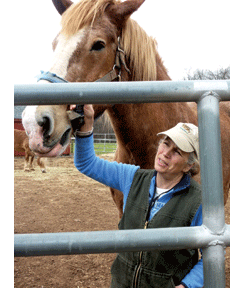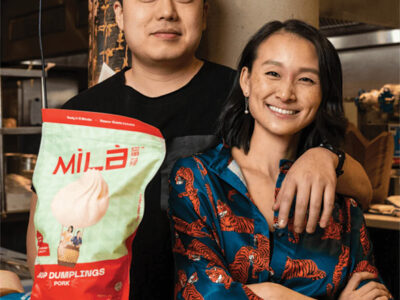
Class of ’87 | Sometimes the kids drop the fresh eggs, still warm from the hen. And sometimes the adults really do leave the barn gate unlatched. But none of that stops Kathleen Fields GNu’87 from opening her 28-acre Flint Hill Farm in Coopersburg, Pennsylvania, to just about anyone who’s interested.
As a rooster crows and the sun strains to warm the early-spring air, Fields, in weathered jeans and knee-high waders, strides past lolling sheep and grazing cows. She pauses by a horse paddock.
“Sharing this farm,” she says, “is about being a good steward of what I’ve been given.”
Fields accomplishes that partly by leading farm tours for local children with disabilities and offering overnight stays to those who want to try their hand at farm chores—part of her ever-expanding mission to “teach people about open space, about the humane care of animals, about where their food comes from,” she says. But there’s more to it than that.
The profit-making efforts—the dairy, as well as corporate retreats, a small farm-stay operation, and open-houses that feature hayrides and holiday lighting—are all in the service of Fields’ nonprofit educational services.
“In the Amish community, everyone has a job,” she says. “No one is too old or too disabled. Everyone is considered to have a gift and to be able to contribute. Seeing that inspired me to start thinking about how the farm could be used to help young people with physical and developmental challenges.”
As part of the program, small groups of students come from the local school district and special-education centers, and return to the farm a few times a week. All told, Flint Hill welcomes about 40 students a semester. Fields works with educators to determine how to match students with tasks.
“There’s one young man with mild autism who has no small motor skills, so if he picks up eggs, he immediately drops them,” she says. “His larger motor skills are really strong, though—he can easily move a chicken house. But he has no focus. We worked for six months on having him carry buckets back and forth without spilling the contents.”
Fields has also opened up the farm’s educational component to the larger community of local students for school tours.
“The farm is amazing, and a real blessing,” she says. “But it’s just an extension of my work as a midwife where I care for a lot of indigent people. It’s in my life for a reason—it’s been given to me to share.”
It’s a mission she came to relatively late in life. A passionate horse lover, Fields had assembled a small team of draft horses when, 15 years ago, she discovered a small mom-and-pop farm for sale in Pennsylvania’s Lehigh Valley, about an hour north of Philadelphia. She and her husband thought the farm might work as a sort of gentleman’s operation, a place to board their horses and maybe create a broader equestrian facility.
When the marriage ended, however, Fields, now 61, found herself with a farm, a burgeoning part-time midwifery business, and five children to raise. The same grit that has repeatedly landed her on her feet—from deciding she wanted to become a midwife and insisting that her school of choice find room for her even though classes had officially closed, to knocking on physicians’ doors for weeks until one offered her a part-time job after the birthing center where she worked went out of business—came to her rescue.
“I started learning how to do everything, like how to tend a vegetable garden using only a horse-drawn plow,” Fields recalls. “Putting the 55-pound harness on these huge horses was a project; I was exhausted the first time I succeeded,” she adds with a laugh, her feet planted in the muck next to one of those gentle giants, Mac. At 5-foot-2, she stands only saddle-high to the 17-hand, 1,800-pound horse.
Flint Hill is home to a lot more than just horses these days. Other noteworthy residents include Alfie the pig, who’s pitch-black and wire-haired; Henrietta, a black-and-white chicken; and 61 kids, the youngest of which is the just-born Frankie, a gray-and-white Nubian goat with long floppy ears and a baby’s persistent waaaaah. He and his fellow newborns are sequestered in one of a series of red-painted shacks that dot the farm.
A group of human kids has just left the 1910 blacksmith’s workshop—which features a pale green wood-burning Glendale stove—that serves as a de facto classroom. Overlooking it all is Fields’ 1850s clapboard home, where Faith, an Australian cattle dog and pointer mix, has the run of the place.
Although her grandparents were farmers in Indiana, and Fields had worked on a New Jersey farm in exchange for boarding her horses as a kid, it wasn’t until she attended a conference about seven years ago that she really got this modest operation going.
A group called the Pennsylvania Association for Sustainable Agriculture “challenged us to look at our farms in new ways,” she says. “To see what we had and what we could do. The next day when I drove up to Flint Hill, I realized that there were no other farms around here and started thinking about the possibilities.”
One possibility was to establish a dairy, using the milk of the resident goats and cows to produce cheeses and yogurts. Pasteurizing equipment now occupies another little building, ripe with milky bouquets. Here, Flint Hill rolls out an array of products for clients like Bon Appetit Management Company, which manages Penn’s dining services.
That’s satisfying for Fields, of course. But as a former nursing grad student, there is something particularly satisfying about seeing the therapeutic effects of farm work on young people with disabilities.
“There’s a cause-and-effect at a farm that’s immediately obvious,” she says. “No matter what their disabilities, these kids can see the product of their work—and of their mistakes.”
—JoAnn Greco




